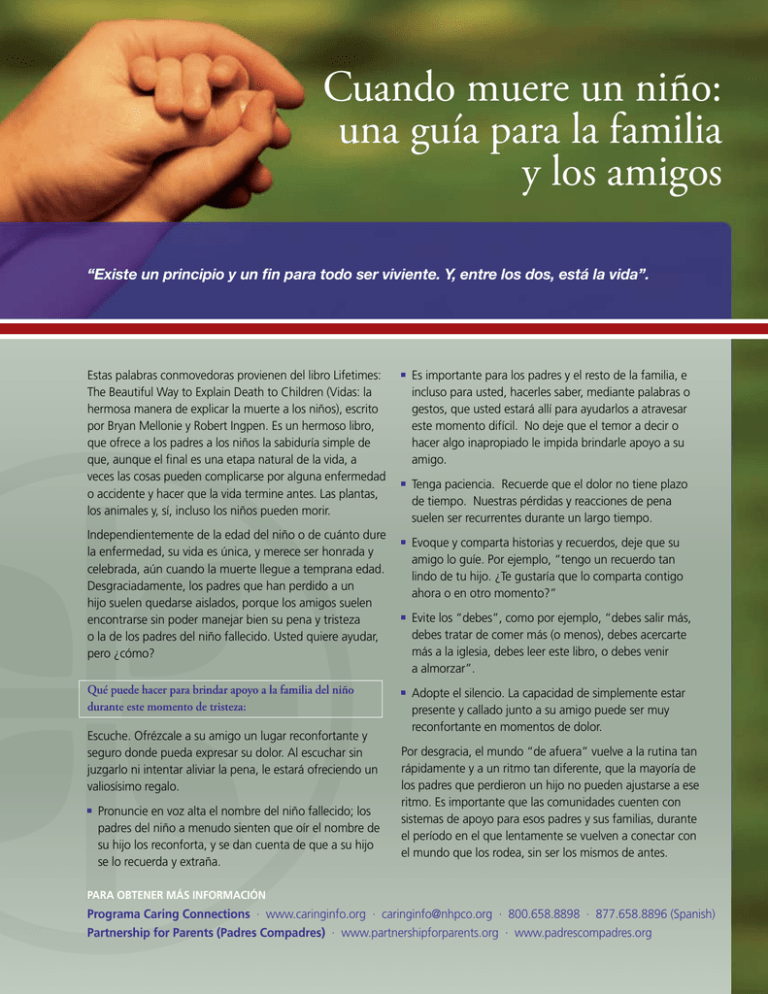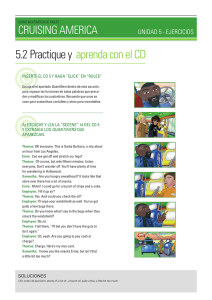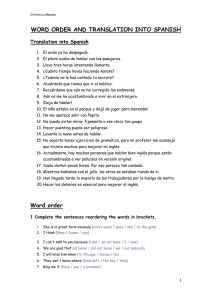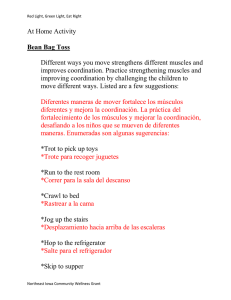Cuando muere un niño: una guía para la familia y los amigos
Anuncio

Cuando muere un niño: una guía para la familia y los amigos “Existe un principio y un fin para todo ser viviente. Y, entre los dos, está la vida”. Estas palabras conmovedoras provienen del libro Lifetimes: The Beautiful Way to Explain Death to Children (Vidas: la hermosa manera de explicar la muerte a los niños), escrito por Bryan Mellonie y Robert Ingpen. Es un hermoso libro, que ofrece a los padres a los niños la sabiduría simple de que, aunque el final es una etapa natural de la vida, a veces las cosas pueden complicarse por alguna enfermedad o accidente y hacer que la vida termine antes. Las plantas, los animales y, sí, incluso los niños pueden morir. Es importante para los padres y el resto de la familia, e incluso para usted, hacerles saber, mediante palabras o gestos, que usted estará allí para ayudarlos a atravesar este momento difícil. No deje que el temor a decir o hacer algo inapropiado le impida brindarle apoyo a su amigo. Independientemente de la edad del niño o de cuánto dure la enfermedad, su vida es única, y merece ser honrada y celebrada, aún cuando la muerte llegue a temprana edad. Desgraciadamente, los padres que han perdido a un hijo suelen quedarse aislados, porque los amigos suelen encontrarse sin poder manejar bien su pena y tristeza o la de los padres del niño fallecido. Usted quiere ayudar, pero ¿cómo? Evoque y comparta historias y recuerdos, deje que su amigo lo guíe. Por ejemplo, “tengo un recuerdo tan lindo de tu hijo. ¿Te gustaría que lo comparta contigo ahora o en otro momento?” Qué puede hacer para brindar apoyo a la familia del niño durante este momento de tristeza: Adopte el silencio. La capacidad de simplemente estar presente y callado junto a su amigo puede ser muy reconfortante en momentos de dolor. Escuche. Ofrézcale a su amigo un lugar reconfortante y seguro donde pueda expresar su dolor. Al escuchar sin juzgarlo ni intentar aliviar la pena, le estará ofreciendo un valiosísimo regalo. Pronuncie en voz alta el nombre del niño fallecido; los padres del niño a menudo sienten que oír el nombre de su hijo los reconforta, y se dan cuenta de que a su hijo se lo recuerda y extraña. Tenga paciencia. Recuerde que el dolor no tiene plazo de tiempo. Nuestras pérdidas y reacciones de pena suelen ser recurrentes durante un largo tiempo. Evite los “debes”, como por ejemplo, “debes salir más, debes tratar de comer más (o menos), debes acercarte más a la iglesia, debes leer este libro, o debes venir a almorzar”. Por desgracia, el mundo “de afuera” vuelve a la rutina tan rápidamente y a un ritmo tan diferente, que la mayoría de los padres que perdieron un hijo no pueden ajustarse a ese ritmo. Es importante que las comunidades cuenten con sistemas de apoyo para esos padres y sus familias, durante el período en el que lentamente se vuelven a conectar con el mundo que los rodea, sin ser los mismos de antes. Para obtener más información Programa Caring Connections · www.caringinfo.org · caringinfo@nhpco.org · 800.658.8898 · 877.658.8896 (Spanish) Partnership for Parents (Padres Compadres) · www.partnershipforparents.org · www.padrescompadres.org When a Child Dies: A Guide for Family and Friends “There is a beginning and an ending for everything that is alive. And in between is living.” These touching words come from Lifetimes: The Beautiful Way to Explain Death to Children by Bryan Mellonie and Robert Ingpen. This is a lovely book that offers parents and children a simple wisdom that while endings are a natural part of life, sometimes things go wrong through sickness or injury that can make a lifetime end sooner. Plants, creatures and, yes, even children may die. Regardless of the length of the child’s life or illness, his or her lifetime is unique; worth honoring and celebrating even when death comes at a young age. Unfortunately, because friends may find themselves unable to cope with their own grief and sadness or the grief and sadness of the parents, grieving parents often become isolated. You want to help, but how? Things you can do to support the child’s family during this time of sorrow: Listen—offer a place of comfort and safety for your friend to express sorrow. You will be offering your friend a huge gift by listening without passing judgment or attempting to fix the pain. Say the name of the child who died out loud—grieving parents often find it comforting to hear the name of their child spoken aloud and know that their child is remembered and missed. It is important to parents and other family members— and to you—that you let them know through words or action that you will be there to help them through this difficult time. Don’t let the fear of saying or doing the wrong thing stop you from supporting your friend. Be patient. Remember grief has no timeline. We visit and revisit all of our losses and grief reactions over an extended period of time. Reminisce and share stories and memories—let your friend guide you. For example, “I have such a wonderful memory of your child. Would you like me to share it now or another time?” Stay away from “should’s”—for example “You should go out more, try to eat more (or less), go to your place of worship more, read this book, or come over for lunch.” Embrace the silence. The ability to just be present and quiet with your friend can be very comforting during times of sorrow. Unfortunately, the “outside” world may return to its routines so quickly and at a far different pace than one to which most grieving parents can adjust. It is important for communities to create systems of support for the grieving parents and their families as they slowly reconnect with life around them in a changed way. For More Information Caring Connections · www.caringinfo.org · caringinfo@nhpco.org · 800.658.8898 · 877.658.8896 (Spanish) Partnership for Parents · www.partnershipforparents.org · www.padrescompadres.org © 2008 NHPCO. Support for this publication is provided by a grant from The Robert Wood Johnson Foundation, Princeton, New Jersey.




